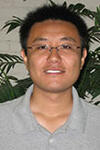Mengzhen Zhang
Gaussian states, operations, and measurements are central building blocks for continuous-variable quantum information processing which paves the way for abundant applications, especially including network-based quantum computation and communication. To make the most use of the Gaussian processes, it is required to understand and utilize suitable mathematical tools such as the symplectic space, symplectic algebra, and Wigner representation. Applying these mathematical tools to practical quantum scenarios, we developed various schemes for faithful quantum transduction, interference-based bosonic mode permutation and ultra-sensitive bosonic sensing. Quantum transduction, proposed for transferring quantum information between different bosonic platforms, will enable the construction of large-scale hybrid quantum networks. We demonstrated that generic coupler characterized by Gaussian unitary process can be transformed into a high-fidelity transducer, assuming the availability of infinite squeezing and high-precision adaptive feedforward with homodyne measurements, all of which are Gaussian operations, measurements or classical communication channels and can be easily analyzed using symplectic algebra. To address the practical limitation of finite squeezing, we also explored the potential of interference-based protocols. It turns out that these protocols can let us freely permute bosonic modes only assuming the access to single-mode Gaussian unitary operations and multiple uses of a given generic multi-mode Gaussian process. Thus, such a scheme not only enables universal decoupling for multi-mode bosonic systems, which can be useful for suppressing undesired coupling between the system and the environment, but also efficient and faithful bidirectional single-mode quantum transduction. Moreover, noticing that the Gaussian processes are appropriate theoretical models for optical sensors, we studied the quantum noise theory for optical parameter sensing and its potential in providing great measurement precision enhancement. We also extended the Gaussian theories to discrete variable systems, with several examples such as quantum (gate) teleportation. All the analyses and conclusions originated from the fundamental quantum commutation relations, and therefore are widely applicable.
